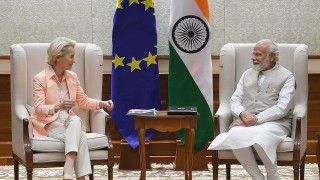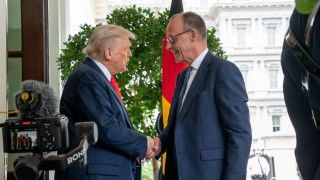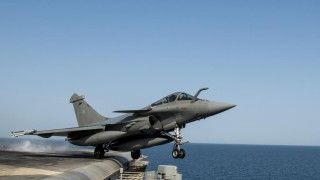- WIADOMOŚCI
Exercise Loyal Leda 2020. Another Proof of NATO’s Readiness
- Exercise Loyal Leda was a 2020 highlight not only for JFTC. This was one of NATO’s most important exercises this year. Loyal Leda 2020 concluded the biggest and most complex series of command post/ computer assisted exercises in NATO’s recent history - as Major General Adam Joks, the Joint Force Training Centre Commander and Loyal Leda 2020 Exercise Director told in an interview, which was released by the JFTC press service.
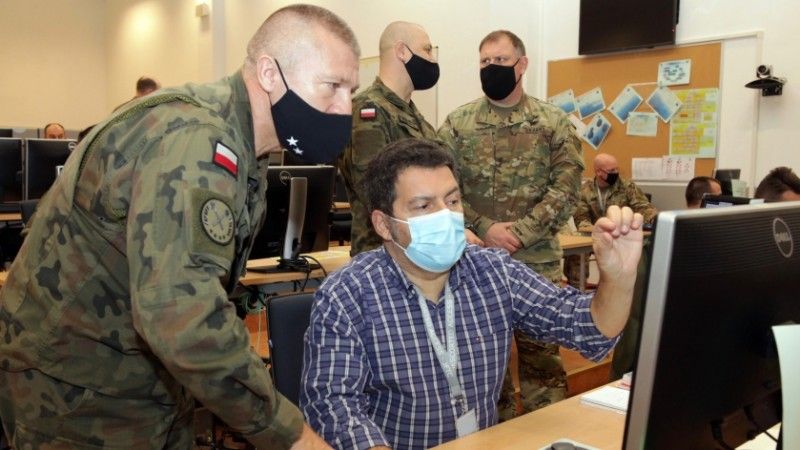
In many recent publications, JFTC referred to Exercise Loyal Leda as to a highlight of 2020. Why was this exercise so critical for the Centre?
Exercise Loyal Leda was a 2020 highlight not only for JFTC. This was one of NATO’s most important exercises this year. Loyal Leda 2020 concluded the biggest and most complex series of command post/ computer assisted exercises in NATO’s recent history. As JFTC Commander, I was appointed the Officer Directing the Exercise. This put a tremendous responsibility on the whole JFTC staff, and especially our Training Division that was responsible for building up and coordination of Exercise Control (EXCON), the “body” responsible for controlling the exercise. The preparation process was very long and meticulous. Detailed coordination with all stakeholders was also demanding. And we are talking about hundreds of engaged soldiers from over 20 nations and most of all, numerous highest level NATO headquarters and commanders, such as Supreme Allied Commander Transformation, who was the Officer Scheduling the Exercise, and Commander of NATO Allied Land Command, the Officer Conducting the Exercise, to name only two. Finally, during the execution, our relatively small team coordinated this really big and ambitious endeavour.
Also the type and the level of the exercise are noteworthy. Loyal Leda was a final step for the Allied Rapid Reaction Corps (ARRC) on their way to combat readiness evaluation (CREVAL). During the event, ARRC commanded four divisions, proving that it was ready and able to lead multinational divisions and up to 120,000 Alliance troops from all domains – Land, Air, Sea, Cyber and Space. This gave the CREVAL team an opportunity to conclude the assessment of the Corps’ ability to adhere to NATO standards and to work smoothly along NATO nations.
With all these, Loyal Leda 2020 stood out as the most challenging and also most rewarding event JFTC was responsible for in 2020.
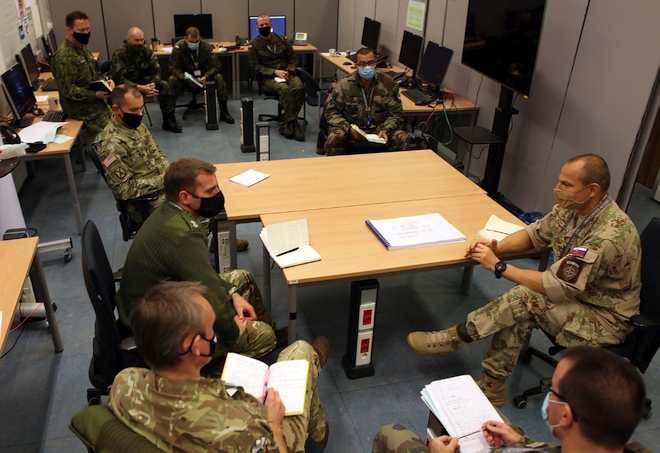
You mentioned that the planning process for such exercises is very long and demanding. Additionally, close to the execution, planners had to re-adjust the concept of EXCON due to COVID-19. How did this influence JFTC role in the exercise?
Yes. This was another challenge we had to face. We cannot say that it came as a surprise, because for the last few months we have all been fully aware of how dynamic the situation related to the pandemic may be. However, we had to implement some adjustments at the very last moment to make the exercise happen.
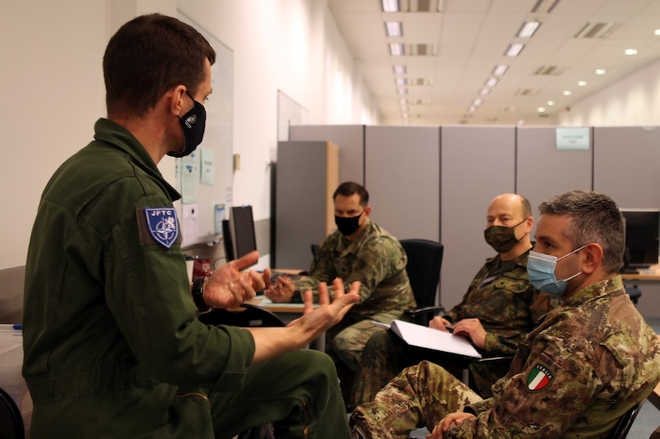
The initial plan was to locate EXCON, approximately 500 people, at JFTC premises, in Bydgoszcz, Poland. Such organization creates the most convenient environment for training, and this is always our “plan A”. Getting ready for the exercise, we prepared a very complex infrastructure, including tents at the JFTC expeditionary training area, to execute the exercise effectively, and to implement social distancing requirements to keep experts working at JFTC safe in the time of COVID-19. Unfortunately, the pandemic situation worsened to such an extent, that the only right decision was to minimise the number of travels, resign from gathering soldiers in one location, and thus to conduct EXCON work remotely.
The main adjustments we had to implement to the construct of the exercise were related to location and structure of EXCON. We had to decide how to divide it, where to locate its
elements and how to coordinate the work to make the exercise run smoothly. Loyal Leda 2020 was the first exercise of this scale and this type during which EXCON members worked from different locations. Eventually, the core was based at JFTC, and other parts of EXCON worked from Germany, the Netherlands, Romania and the United Kingdom. The number of soldiers and experts supporting the exercise also changed. Instead of 500 EXCON members, approximately 350 supported the distributed exercise.
With all the changes, EXCON, training forces and supporting units were working concurrently from numerous locations in North America and Europe, and JFTC became a hub for all distributed sites connecting all forces involved.
How did you manage to deal with these changes in this relatively short time?
The time was, in fact, one of the biggest challenges. NATO, however, is always ready – even for the most demanding challenges. Although the time was very tight, we had plans in place to make everything work and to make it work on the highest level.
Significant reduction and distribution of EXCON triggered rearrangements in its structure as well as reassignment of certain tasks and roles. We had to be focused, very precise and very open-minded. Coordination was the key to success.
Another important factor that helped us deal with the challenge was JFTC’s extensive experience in conducting distributed events. Due to COVID-19 many training events and exercises this year partly or entirely shifted to virtual means. We conducted very successful on-line pre-deployment training events for both Resolute Support Mission and NATO Mission Iraq, also the Coalition Warrior Interoperability Exercise was conducted virtually this year. I am sure that all these, along with JFTC state-of-the-art infrastructure and IT systems helped us to prepare and execute a fully professional and safe exercise.
Additionally, I must stress the tremendous support from the Polish Armed Forces. Many Polish soldiers augmented EXCON at JFTC providing critical assistance to the execution of the event. This was yet another example of good cooperation between JFTC and our Host Nation Poland. I would like to take this opportunity to express my heartfelt appreciation to the Polish Armed Forces as a whole and to each and every Polish soldier that augmented EXCON during Loyal Leda 2020.
What was the exact role of JFTC in EXCON?
EXCON has both direction and control functions in establishing conditions that allow participating forces to achieve exercise aims and objectives. We played critical role in planning and in overall execution of the exercise. During a long and robust planning process, we conducted and participated in numerous meetings, workshops, video teleconferences and in working-level coordination sessions that allowed us to prepare the demanding exercise for ARRC.
To steer the exercise both in direction and tempo, and thus to enhance learning opportunities and reinforce key lessons, our experts and operators prepared a number of injects - tasks, collected in events and incidents lists. During the event, we challenged the trainees with those as the situation planned in the scenario developed. Problems or twists that we implemented into the exercise, reflected the anticipated future and let us create conditions as close to reality as possible. To respond to those challenges, the Corps Commander had to adjust the conducted actions e.g. to loses, to a sudden increase of adversary forces or to a situation when a part of the forces had to be moved to fight another threat. There were many other challenges that could potentially emerge during a real operation.
All that has helped us improve training audience’s capability to cope with future challenges. The same applies to every EXCON member. We have also managed to improve NATO’s readiness and ultimately make NATO better. This is what we are here for.
Although it is too early to make a thorough assessment of the exercise, are there any first thoughts, findings or conclusions that you would like to share?
A thorough analysis of the exercise outcomes is being carried out as we are talking. This will result in detailed findings, lessons identified and eventually lessons learned that we will implement into future exercises. This very in-depth and comprehensive process requires profound exploration as it allows NATO to develop and to maintain its readiness on the highest possible level.
At this stage I can say that the main goals of the exercise have been achieved. This was only possible thanks to the hard work of all parties involved. During the execution, I observed the work of my staff but also specialists that were deployed to EXCON from other NATO units. I saw a team of experts, entirely devoted to their mission. Altogether, over 350 highly motivated professionals formed EXCON. They all had one goal - to successfully execute Loyal Leda 2020 exercise, which was a crucial element for ARRC’s combat readiness and successful completion of CREVAL. Given the reduced and distributed EXCON, it was their motivation and hard work that helped us achieve more than what had been expected. We provided the most challenging and realistic exercise within the limitations of our operational environment.
I am proud to say, that overall feedback I received at various levels, was largely positive.
You mentioned that the traditional way of organizing EXCON, where majority of its members work in one location, is the most convenient exercise environment. But now, after you and JFTC have gained so much experience in on-line and distributed events and also exercises controlled by EXCON working from various locations, do you think there might be some elements worth implementing into traditional exercises after the pandemic is over?
First and foremost, thanks to solutions implemented this year NATO can conduct exercises in the time of crisis like now. We have already worked out various procedures and implemented new tools that allow the Alliance to fulfil its mission without any major disturbances despite limitations. This is the value that we cannot overstate.
I am sure lessons learned we derive from the COVID-19 pandemic will be of huge importance in case other crises emerge. I am also sure, that tools and skills that we have developed recently will stay with us and enrich NATO training and exercises in many ways. I must stress, however, that, as with residential pre-deployment training, also “residential” way of organizing EXCON for command post exercises is and will be our first choice whenever possible. It enables easier and more complex coordination, faster reactions, better communication between participants and thus makes training and exercises more effective.
Centralized EXCON has another important value. It also allows for personal, face-to-face interactions between NATO training experts. This is a critical element of networking, building trust, developing productive co-operation within this important NATO community and thus enhancing training capabilities of the Alliance.
However, and I would like to stress it again, Loyal Leda 2020 was yet another example of NATO’s adaptability to the ever-changing environment, proof of Alliance’s readiness to fulfill its mission and confirmation of JFTC’s strong position as a the key venue for NATO exercises.













